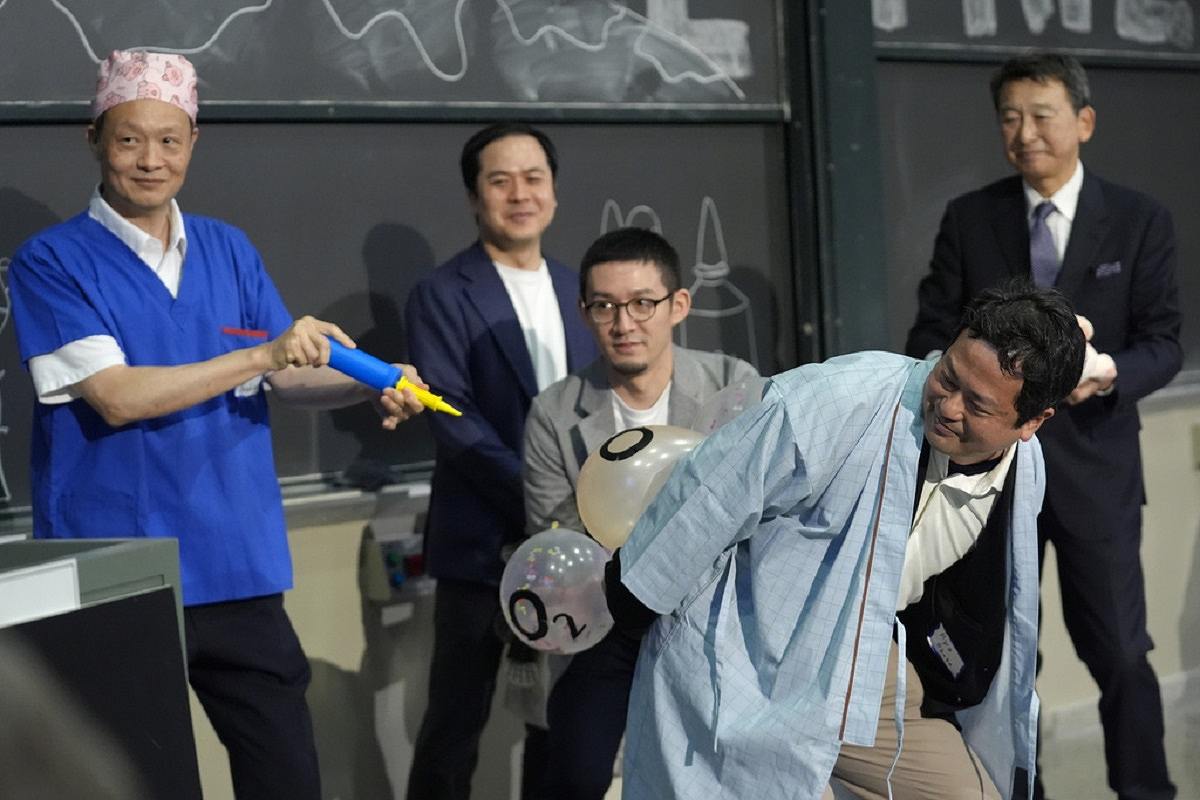
A team of researchers perform a demonstration during a performance showing that many mammals are capable of breathing through their anus while accepting the 2024 Ig Nobel prize in physiology at the Ig Nobel Prize ceremony at Massachusetts Institute of Technology, in Cambridge, Mass., Sept. 12, 2024.
14:03 JST, September 13, 2024
Cambridge, Massachusetts (Jiji Press) — A team of Japanese and U.S. researchers won this year’s Ig Nobel Prize in Physiology on Thursday for their discovery that mammals can breathe using their intestines through the anus.
It is the 18th straight year that Japanese researchers have received an Ig Nobel Prize. The award ceremony was held at the Massachusetts Institute of Technology in a Boston suburb. The annual Ig Nobel Prize, a spoof of the Nobel Prize, was launched in 1991 to honor “achievements so surprising that they make people laugh, then think.”
The team’s research is expected to help alleviate the symptoms of patients suffering from respiratory failure due to diseases such as COVID-19.
Tokyo Medical and Dental University professor Takanori Takebe, 37, and other researchers who began their study on the lungs from the perspective of regenerative medicine, an area in which where they specialize, focused on how loaches breathe. Loaches breathe through gills normally and absorb oxygen through their intestines in a low-oxygen environment.
The team conducted experiments on mice and pigs, in light of the possibility of applying the intestinal breathing method to humans with deteriorating lung function. Liquid containing large amounts of oxygen or oxygen gas was injected into the animals through their anuses, resulting in an increase in blood oxygen and an improvement in survival rates.
The researchers announced the method in 2021, naming it enteral ventilation. They are currently conducting a trial of a medical device that delivers oxygen into the bodies of human patients via the anus, aiming to commercialize it in Japan in 2028 and in the United States in 2030.
Artificial respirators and extracorporeal membrane oxygenation (ECMO) machines are used for patients with respiratory failure. But the physical burden on patients is heavy, and handling the machines is difficult.
Takebe told Jiji Press that enteral ventilation can also be used for extremely premature babies. “The technology has still not been widely accepted, but I hope people will learn about it with interest” following the winning of the Ig Nobel Prize for the research, he said.
Takebe and co-researchers including Ryo Okabe, a 45-year-old Japanese doctor, and Toyofumi Yoshikawa, 52, a professor at Nagoya University in central Japan, appeared at the award ceremony wearing caps shaped like a loach, and explained how they conducted their research.
The Ig Nobel Prize award ceremony took place in person for the first time in five years. The past four ceremonies were held online due to the COVID-19 pandemic.
Top Articles in Society
-

Producer Behind Pop Group XG Arrested for Cocaine Possession
-

Man Infected with Measles Reportedly Dined at Restaurant in Tokyo Station
-

Man Infected with Measles May Have Come in Contact with Many People in Tokyo, Went to Store, Restaurant Around When Symptoms Emerged
-

Woman with Measles Visited Hospital in Tokyo Multiple Times Before Being Diagnosed with Disease
-

Australian Woman Dies After Mishap on Ski Lift in Nagano Prefecture
JN ACCESS RANKING
-

Producer Behind Pop Group XG Arrested for Cocaine Possession
-

Japan PM Takaichi’s Cabinet Resigns en Masse
-

Man Infected with Measles Reportedly Dined at Restaurant in Tokyo Station
-

Israeli Ambassador to Japan Speaks about Japan’s Role in the Reconstruction of Gaza
-

Videos Plagiarized, Reposted with False Subtitles Claiming ‘Ryukyu Belongs to China’; Anti-China False Information Also Posted in Japan























